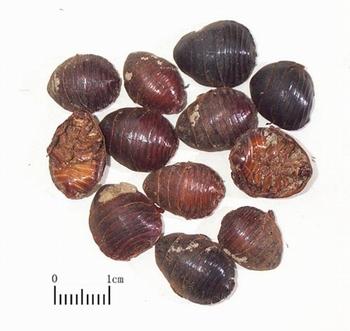蟄蟲
Naming
Tu Bie Chong (Woodlouse)——Shen Nong Ben Cao Jing (Shen Nong’s Herbal)
Origin
The dry female insect Eupolyphaga sinensis Walker or Steleophaga Plancyi (Boleny) of family Corydiidae.
Location
Hunan, Hubei and Jiangsu provinces in China.
Harvest
Collect the wild in summer and all the time for the raised ones.
The actual smell and taste
Fishy smeil, lightly salty taste.
Best quality
Complete, purplish brown.
Processing
Blanched by boiled water, dried in the sun or baked.
Property
Salty, cold, lightly toxic; liver meridian entered.
Actions
Break blood and dispel stasis, reunion of fractured tendons and bones.
Indications
A. Traumatic injuries, soft tissue injuries, congestion, swelling and pain.
This herb can activate blood, resolve swelling, alleviate pain, reunion of fractured tendons and bones, and cure trauma. It is indicated for traumatic injuries, soft tissue injuries, bone fracture, congestion, swelling and pain. For bone fracture, it is used with yellow rice wine or made powder for external application or combined with blood-activating and stasis-dispelling herbs and trauma-curing analgesics. For instance, it is combined with Ru Xiang, Zi Ran Tong and Gu Sui Bu, etc. in Jie Gu Zi Jin Dan from Za Bing Yuan Liu Xi Zhu (An Insight into the Origin of Diseases). For weak tendon and bone in the late stage of bone fracture and soft tissue injuries, it is usually combined with liver-kidney-tonifying herbs and tendon and bone-strengthening herbs. For instance it is combined with Du Zhong and Xu Duan, etc. in Zhuang Jin Xu Gu Wan from Shang Ke Da Cheng (Great Compendium of Traumatology).
B. Amenorrhea due to stasis, mass
This herb can break blood, dispel stasis to resolve mass and induce menstruation. Doctors in past dynasties all used it as a miraculous herb in treating amenorrhea due to stasis, postpartum abdominal stagnant pain and mass. For amenorrhea due to stasis, and postpartum abdominal stagnant pain, it is usually combined with blood-activating and menstruation-regulating herbs. For instance, it is combined with Da Huang and Tao Ren, etc. in Xia Yu Xue Tang from Jin Kui Yao Lue. For chronic consumptive disease due to blood stasis, amenorrhea and abdominal fullness and scaly skin, it is combined with Da Huang and Shui Zhi, etc. in Da Huang Zhe Chong Wan from Jin Kui Yao Lue. For mass, it is usually combined with blood-breaking and stasis-dispelling herbs. For instance it is combined with Chai Hu, Tao Ren and Bie Jia, etc. in Bie Jia Jian Wan from Jin Kui Yao Lue.
Dosage and Administrations
Decoct 3~10 g. Make powder and take 1~1.5 g with yellow wine. Proper dose for external application.

